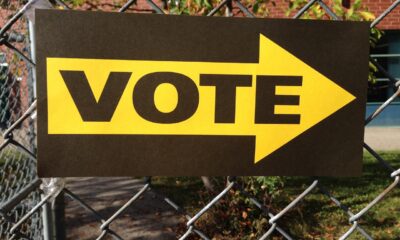Civilization
Trump’s McDonald’s Strategy Is Working
Donald Trump slings fries at McDonalds and reaches the people where they live, while Harris goes over their heads.

Donald Trump is staging photo ops in which he serves Big Macs to steelworkers while Kamala Harris is hanging out with NeverTrump neoconservative Liz Cheney. If that sounds like a setup to a bad joke, it might as well be – at least for the Harris campaign in Pennsylvania. The vice president’s attempts to win over this can’t-lose swing state by aligning with a Republican outcast have proven about as effective as trying to sell lab-grown hot dogs at a Steelers tailgate.
Trump reaches the people, while Harris stays over their heads
Trump’s latest ad blitz in Pennsylvania – particularly the “Kamala is for they/them” spot that’s drawing both outrage and grudging respect for its effectiveness – showcases his trademark ability to dominate narratives through controversy. The ad, which features an unauthorized clip of radio host Charlamagne tha God criticizing taxpayer-funded gender transition surgeries, has sparked legal threats but achieved its intended effect. Even Charlamagne himself, while sending a cease-and-desist letter, acknowledged the ad’s potency, remarking “Since when does Trump care about what’s legal?”
This willingness to court controversy while maintaining a nonstop grassroots presence is proving devastatingly effective. Trump shows up to work the fryer at a McDonald’s in suburban Philadelphia, poses with former Steelers and notable loose cannons Le’Veon Bell and Antonio Brown at Pittsburgh football games, and blankets working-class neighborhoods with signs bearing simple messages: “Trump: Safe Borders/Kamala: Open Borders,” “Trump: Low Inflation/Harris: High Inflation.” It’s Lowbrow Politics 101, but it’s working.
The Harris campaign’s response? A slickly-produced counter-ad featuring a supposed Pittsburgh everyman that rings about as authentic as the “Pittsburgh Dad” YouTube parody series. In the spot, a generic “Yinzer” – Pittsburgh slang for a working-class local – delivers practiced lines about Trump being a “little silver spoon boy” who “literally lives in a country club.” The ad feels focus-grouped to death, like a “Saturday Night Live” sketch written by consultants who’ve never set foot in Western Pennsylvania.
Pennsylvania residents tell what worries them
The Commonwealth Foundation’s recent polling illuminates why Trump’s straightforward negative messaging about Democrat-fueled economic decline is finding such a receptive audience. Nearly seven in ten Pennsylvania voters report that inflation and rising prices are actively eroding their standard of living, with 34% saying it affects them “a great deal” and another 35% reporting “a fair amount” of impact. More than half the state’s voters believe their economic situation is actively getting worse, not better. These numbers reflect a deep pessimism that no amount of carefully choreographed ads about Trump’s silver spoon upbringing can easily counter.
The contrast in campaign strategies couldn’t be starker. Harris is pursuing what might be called the “responsible Republican” strategy – attempting to build a coalition of moderate conservatives and anti-Trump voters by embracing GOP outcasts like Cheney. It’s here an approach that seems perfectly calibrated to appeal to exactly no one – save, perhaps, for affluent boomer uncles who like their taxes low and their discourse civil.
Trump runs the Man of the People campaign
Progressive Democrats have little interest in rehabilitating Bush-era neocons, while Trump-skeptical Republicans either left the right or made their separate peace with MAGA. Trump, meanwhile, is running a campaign that would make any Ivy League political scientist’s head explode – and that’s precisely why it’s working. Though stunts like the McDonald’s appearance might be photo ops, he’s showing up in places politicians usually only visit to shake a few hands and actually spending time there. His ads may be crude and questionable, but they’re punchy and speak directly to kitchen table issues. When voters are worried about affording groceries and heating bills, Trump’s populist messaging about government spending on social programs lands with particular force.
The Harris campaign’s attempts at populist messaging feel forced by comparison. Their “Yinzer” ad, with its stock protagonist and carefully curated working-class aesthetic, comes across like what coastal elites imagine Pittsburgh residents sound like (and the goateed star of the commercial is, like Harris’s running mate Tim Walz, notably non-threatening and soft-voiced). It’s the political equivalent of putting French fries on a salad and claiming you understand local culture.
All this matters because Pennsylvania isn’t just another swing state – it’s potentially the swing state. Most polling shows races for president, U.S. Senate, and state offices remain tight, with Democratic candidates holding minuscule leads within the margin of error. But independent voters are overwhelmingly dissatisfied with their choices and largely undecided in down-ballot contests.
Are you better off now? No
The final days of this campaign will likely turn on which candidate better speaks to voters’ economic anxieties. Trump’s crude but effective messaging and physical presence in working-class communities is currently winning that battle. Unless Harris can find a way to convince voters she understands their daily struggles – beyond just having actors pretend to be them in campaign ads or ad-libbing that heckling Christians are at the wrong rally – her coalition-building with never-Trump Republicans may prove to be exactly what Trump needs to reclaim Pennsylvania’s crucial electoral votes.
After all, you can’t eat coalition-building with the likes of legacy Republicans like Liz Cheney. But you can eat a Big Mac with our “short-fingered vulgarian” of a former president who, whatever his other faults, at least pretends to care about the price of all the hamburger meat that isn’t made out of soy or grown, Frankenfood-style, in a lab. In an election that may well turn on authenticity – or at least the appearance of it, which is where Trump excels and Harris struggles – that difference might just decide who wins the Keystone State and seizes the keys to the White House.
This article was originally published by RealClearPennsylvania and made available via RealClearWire.
Oliver Bateman is a historian and journalist based in Pittsburgh. He blogs, vlogs, and podcasts at his Substack, Oliver Bateman Does the Work.
-

 Accountability4 days ago
Accountability4 days agoWaste of the Day: Principal Bought Lobster with School Funds
-

 Civilization1 day ago
Civilization1 day agoWhy Europe Shouldn’t Be Upset at Trump’s Venezuelan Actions
-

 Executive2 days ago
Executive2 days agoHow Relaxed COVID-Era Rules Fueled Minnesota’s Biggest Scam
-

 Constitution3 days ago
Constitution3 days agoTrump, Canada, and the Constitutional Problem Beneath the Bridge
-

 Christianity Today1 day ago
Christianity Today1 day agoSurprising Revival: Gen Z Men & Highly Educated Lead Return to Religion
-

 Civilization2 days ago
Civilization2 days agoThe End of Purple States and Competitive Districts
-

 Executive2 days ago
Executive2 days agoWaste of the Day: Can You Hear Me Now?
-

 Civilization5 days ago
Civilization5 days agoThe Conundrum of President Donald J. Trump










